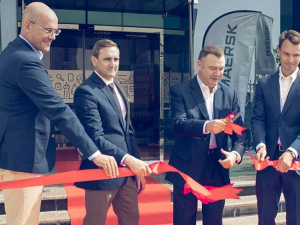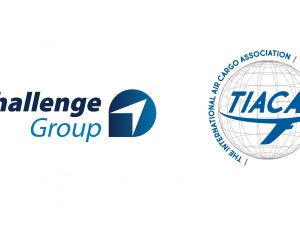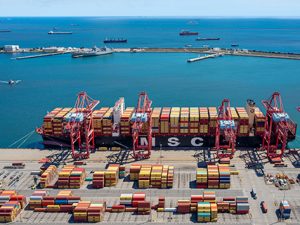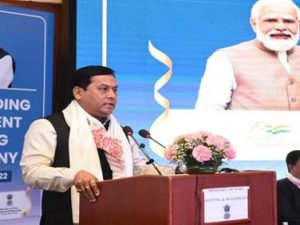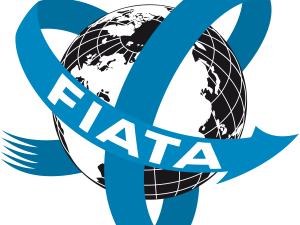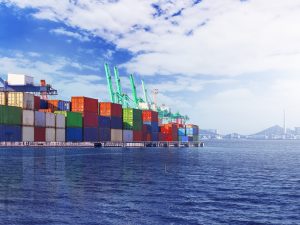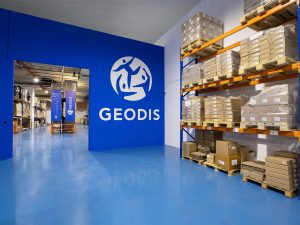Maersk Kanoo UAE, an integrator of container logistics, today inaugurated its first Integrated Logistics Centre in Dubai, UAE, at DP World’s leading trade and logistics hub, Jafza. The Maersk Integrated Logistics Centre was inaugurated by Richard Morgan, Regional Managing Director, Maersk West & Central Asia and Christopher Cook, Managing Director, Maersk UAE, in the presence of Maersk’s top W&D customers in the UAE. “It is an important milestone for us today as we inaugurate our first Integrated Logistics Centre in the UAE and strengthen our commitment towards our customers in the Middle East. Our journey towards creating end-to-end logistics solutions is taking a definite shape as we continue to connect and simplify our customers’ supply chains through solutions that are designed and executed considering their specific requirements and challenges,” said Morgan. Ocean shipping and inbound logistics and distribution have traditionally been shared amongst multiple stakeholders in the region, resulting in complex logistical requirements. With the brand new Integrated Logistics Centre in Dubai, Maersk is taking an important step towards building a truly integrated solution for its customers wherein the customers will get a single window access to multiple logistics requirements, not only for the goods flowing in and out of the UAE but even other Middle Eastern countries that use Dubai as a gateway to global trade. Decarbonising logistics and services Maersk has a strong commitment to decarbonising logistics and services. The facility will have solar panels on its rooftop to cater to all of its electricity requirements for facility operations. The 434 MWh/year clean energy production of this installation will reduce more than 1,700 tonnes of carbon emissions over 10 years, an equivalent decarbonisation feat achieved by planting over …
Read More »LATAM plans to neutralise carbon emissions from cargo flights in South America
LATAM Airlines Group announced that it will compensate the CO2 emissions of the first nine routes in Chile, Ecuador, Peru, Brazil, and Colombia every Friday through its “Let’s Fly Neutral on Friday” programme. Through this initiative, which is part of the group’s sustainability strategy, LATAM will support conservation projects that prevent deforestation in strategic ecosystems in South America by offsetting CO2 emissions generated on routes, including passenger and cargo flights. Emblematic passenger routes will be offset at a regional level, including Santiago-Chiloé, Galapagos-Guayaquil, Arequipa-Cusco, and Rio de Janeiro-São Paulo. LATAM will also offset cargo flights on routes including Iquitos-Lima, Guayaquil-Baltra Island, Brasília-Belém and Bogotá-Miami routes. LATAM plans to gradually incorporate new routes and more conservation projects into each country in the coming months. “This initiative is another step that we have been implementing to reach carbon neutrality by 2050. Let’s Fly Neutral on Friday will allow us to turn one day of the week into an opportunity to support strategic ecosystem conservation projects in the region. These projects not only offset CO2 emissions, but they also contribute to protecting biodiversity and the economic development of communities,” said Juan José Tohá, Director of Corporate Affairs and Sustainability of LATAM. Each carbon dioxide (CO2) tonne emitted on these routes will be offset with a carbon credit, equivalent to one tonne of CO2 captured by a conservation project. The carbon offsetting of these routes will initially be managed through the CO2BIO flooded savanna conservation project, located in the Colombian Orinoquía, a strategic ecosystem that has iconic biodiversity. The initiative will conserve 200,000 hectares of floodable savannah, providing habitat for more than 2,000 species. Over the next few months, LATAM Airline Group hopes to …
Read More »TIACA now has cross-industry presence through Challenge Group
As one of TIACA’s newest members, Challenge Group brings a panoramic industry viewpoint to the association and has adopted the topic of sustainability as its initial focus point. Stronger and better together is doubly relevant when it comes to Challenge Group. The unique air cargo conglomeration has not only been working on bringing its individual fractions together under one brand, but it also seeks to offer its combined expertise to the international air cargo community. Challenge Group, therefore, recently became a member of The International Air Cargo Association (TIACA). “We joined as a non-voting member in October 2021,” says Yossi Shoukroun, CEO of Challenge Group, “because we are keen to contribute proactively and tangibly to the future of our industry. Challenge Group has more than four decades of air cargo airline experience. We’ve been involved in air cargo handling for almost 25 years, provide extensive road feeder services, and can offer other aviation expertise, too, so I believe that, as a group, we can bring valuable input to the broad TIACA community, a motivated community that has a clear direction for the future of our industry. There is strength in numbers, and it is this strength that will drive change. Together with other supply chain stakeholders, we can make significant progress on the many changes that are necessary for a cleaner, more efficient, and collaborative air cargo industry.” Glyn Hughes, Director General of TIACA, states, “It is with great pleasure that we welcome the Challenge Group to the TIACA membership family. They have a wonderful vision for sustainable growth and transformation, and we are excited about supporting the group on their journey.” One TIACA topic, particularly in focus within the …
Read More »MSC joins White House FLOW project to boost supply chain data sharing
MSC is pleased to be part of the Freight Logistics Optimization Works (FLOW) data-sharing initiative, launched at the White House on March 15, 2022. This major project will help to clear supply chain bottlenecks by improving freight information exchange between key stakeholders and consumers, leading to faster delivery times and reduced costs for consumers. A diverse taskforce representing many stakeholders FLOW includes 18 initial participants, with the aim of welcoming more in the future. Representing diverse perspectives across the supply chain, partners include US-based port authorities, terminal operators, private businesses, logistics, and warehousing companies, as well as the ocean carriers MSC and CMA CGM. The FLOW partners will work together with the US Administration to develop a more efficient and transparent way of sharing information. The idea is to create a new digital tool where each company can share accurate, cargo-related data in real-time. “We are pleased to join and support the FLOW initiative led by the US Department of Transportation, as we strongly believe that a common and interoperable digital infrastructure throughout the container shipping industry is a critical step to making supply chains more efficient, secure, and resilient. Collaboration with governments and other key industry stakeholders is of paramount importance to MSC, and there is no doubt that this initiative will strengthen the foundation for the seamless, end-to-end exchange of information we all need to keep global trade moving today – and tomorrow,” said André Simha, Chief Digital and Information Officer at MSC. Shaping the future, together MSC is committed to building strong, cross-industry partnerships that pave the way towards a better future for shipping by taking advantage of digitalization opportunities. Examples of the company’s recent collaborations include …
Read More »Dredging Corp inks Ship Building Agreement with Cochin Shipyard
The Dredging Corporation of India has signed a historic Ship Building Agreement for the first Make in India project for the construction of the first Beagle Series 12 Trailing Suction Hopper Dredger of 12000 Cubic Meter capacity at Cochin Shipyard Limited today in the presence of Union Minister of Ports, Shipping & Waterways, Sarbananda Sonowal, MoS Shripad Naik, and Secretary for Ports, Shipping and Waterways, Dr Sanjeev Ranjan. Speaking on the occasion, Sarbananda Sonowal said the Ministry, noting the importance of dredging for the operation of ports, has issued Dredging Guidelines for Major Ports. He said the need for sufficient dredgers is of utmost importance for timely completion of dredging and that the new dredgers would be able to bring in the much-needed efficiency and timely completion of dredging. He said this in turn would enable the smooth operation of vessels. Sonowal said the dredger built under the ‘Atma Nirbhar Bharat’ concept is one of the largest initiatives under Atmanirbhar Bharat and is a true reflection of international collaboration for Make in India. He said the Ministry, under the guidance of Prime Minister Narendra Modi, would be able to fulfill the objectives of the Maritime India Vision 2030 with well-equipped dredgers for the operation of ports to bring down the logistical cost of the cargo. Sonowal said that this Ship Building Agreement would also benefit from the Shipbuilding Financial Assistance Policy (SFAP) (2016) of the Ministry of Ports, Shipping & Waterways for Indian Shipyards for shipbuilding contracts secured between 01.04.2016 and 31.03.2026. Financial assistance is granted under this policy to Indian shipyards equal to 17 per cent of the lower of “contract price” or “fair price” or “actual payments received”, …
Read More »RU-UA crisis is severely disrupting global supply chains: FIATA
The FIATA Multimodal Transport Institute (MTI) gathered to address the implications of the ongoing events in Ukraine for freight forwarding and logistics spanning sea, rail, and road transport. Aside from the catastrophic human repercussions, which the industry is particularly sensitive to, global supply chains, which have already been weakened by the effects of the pandemic and the current maritime crisis, are being severely disrupted. Driver shortages, difficulty transporting freight within the impacted zone, and capacity challenges have all been cited. Rising fuel prices are projected to be a concern for the whole industry. It was observed that multimodal solutions are critical to guaranteeing the movement of commodities throughout the impacted area during this war, with border crossings apparently feasible by rail transit via Moldova and the Port of Galati, or via Romania, which gives port access. Trans-Caspian routes are projected to be crucial. Members of FIATA should be aware of the sanctions imposed by certain countries in reaction to the conflict, and should visit the appropriate government pages on a regular basis. Countries currently enforcing relevant sanctions include, among others, Australia, the European Union, the United Kingdom, and the United States. It is understood that more sanctions are being considered.
Read More »Major Port Authorities Act, 2021 to enable setting of port services’ tariffs
The Major Port Authorities Act, 2021 regulates, operates, and plans major ports in India and vests administration, control, and management of such ports in Major Port Authorities Boards. The legislation enables these ports to operate more efficiently as a result of improved decision-making autonomy and modernisation of their institutional framework. These ports have been given the authority to establish a scale of rates for port services and assets. Tariffs can be set by PPP concessionaires based on market conditions, for example. The compact Board of Directors, comprised of experienced independent members, is capable of boosting decision-making and strategic planning. Prior to the implementation of the Act, the overall capacity of major ports and the volume of cargo handled were as follows: *million tonnes per annum Connectivity is a vital enabler for ports since it is the end-to-end efficacy of the logistics chain that promotes industrial competitiveness. The Sagarmala initiative features a particular pillar of port connection projects to improve connectivity between ports and domestic production and consumption hubs. Under Sagarmala, 190 road and rail connectivity projects costing Rs 1.22 lakh crore have been identified for execution, with an emphasis on connecting large and minor ports. Fifty of these projects have been finished, while the remaining 140 are in different phases of development and execution. The Ministry of Road, Transport, and Highways (MoRTH), major port authorities, and other state organisations are principally in charge of implementing these projects. The government has launched a number of programmes aimed at port modernisation, automation, and digitalisation, with a focus on ease of doing business. This includes the implementation of web-based e-forms, direct port delivery, container scanners, radio frequency identification-based technologies for gate automation, a …
Read More »Elixia Tech Solutions revamps its website with added features for logistical ease
Elixia Tech Solutions revamps its website by adding new features for the ease of new users. The website has all the desired features and information just a click away, with complete details and a free demo for new users. These new features will help supply chain professionals become more efficient with greater ease of understanding. Elixia Tech Solutions has redesigned the website as a one-stop solution for all logistical needs. Elixia Connect and Elixia Lite are also available on the Google Playstore and Apple Appstore. The website has all the required details for the users handy with a single click. Supply chain vendors who aim to digitalise their work can also easily schedule a free demo as per their convenient timeslot just by clicking the “Schedule demo” option added on the website. This feature will lead the vendors to a calendar where they can select the date and time slot for an introductory call with the concerned team and understand how Elixia works. They have also added more insights and details in every module of the supply chain control tower chapter. This will help their logistics and transport partners of Elixia Tech Solutions to have a better understanding of all the products of Elixia and how they digitise the whole process of transportation and logistics.
Read More »Zero COVID-19 lockdowns will harm China’s supply chain more than Russia-Ukraine crisis
In the two weeks since Russia’s invasion of Ukraine, there seems to be a negligible impact on container prices and leasing rates in China. Container availability has improved from soon after the Chinese New Year until Friday across key ports in China. However, with the announcement of nationwide lockdowns, the supply chain must prepare for more turmoil in the coming months, impeding the flow of container movement as importers worldwide prepare for the peak season later this year. At the port of Ningbo, average prices for a 40-foot high cube container fell by 10%, approximately from $5930 on February 14th to $5329 on February 27th. As of March 10, this price stood at $5248. Similarly, average prices fell by 10–15% at the ports of Shanghai, Qingdao, and Shenzhen till March 11. Shenzhen witnessed a drop of 8% in the past two weeks. However, the lockdowns in Shenzhen, Zhejiang, Shanghai, Jilin, Suzhou, Guangzhou, and Beijing (19 provinces as of Sunday, probably more to come in a few days) imposed now will clearly heavily restrict container movement at these ports, which will, as we’ve seen in the past, prove to be further damaging to the global supply chain. Clearly, 2022 has not brought any cheer to the supply chain industry. On top of this, war will just prove to be another disruption amongst the other innumerable factors for China’s supply chain. Freight rates and container prices were already at a record high even before the invasion started, and what happened immediately due to the war was that the Russian ports were not being called by the national shipping lines anymore, the Black Sea being somehow closed, and the Asia-European railway being quite …
Read More »GEODIS gets GDP accreditation in China, bolstering its position in healthcare market
GEODIS has obtained Good Distribution Practice (GDP) Accreditation in China as the company ramps up its logistics services to meet the demands of the growing healthcare market. With COVID-19 exposing the emerging risks and weaknesses of the pharmaceutical industry’s supply chain, this accreditation underscores GEODIS’ commitment to ensuring the quality and integrity of pharmaceutical products for its customers across the logistics ecosystem. The implications of the accreditation are extensive, given the stringent requirements published by the Chinese Ministry of Health (MOH) in 2013. The GDP certification requires comprehensive audits of all operational procedures in warehouses, ensuring that they are compliant with the highest industry standards for handling pharmaceutical products. This review process further highlights the role that logistics service providers play as vital partners in the healthcare supply chain. “GEODIS is fully committed to ensuring our pharmaceutical and healthcare customers’ success in maintaining their delivery standards and reputation for high-quality products,” said Onno Boots, President and Chief Executive Officer, Asia Pacific, GEODIS. “This GDP accreditation demonstrates our continued dedication to providing industry-leading solutions and services in every aspect to meet the high standards set by China’s Ministry of Health.” India, Korea, Thailand, and Singapore are also in the process of receiving certification from the IATA Center of Excellence for Independent Validators in Pharmaceutical Logistics (CEIV Pharma), which ensures international and national compliance to safeguard product integrity, whilst specifically addressing the requirements for air cargo handling and transport.
Read More » Cargo Breaking News
Cargo Breaking News
